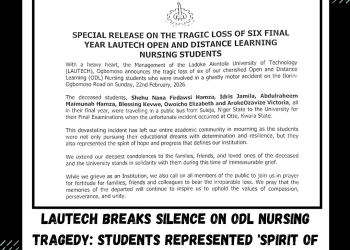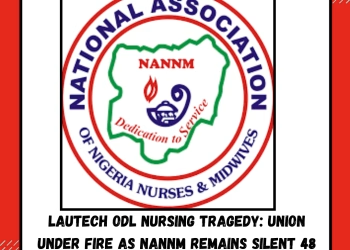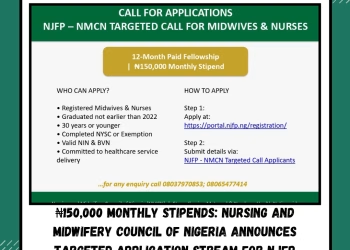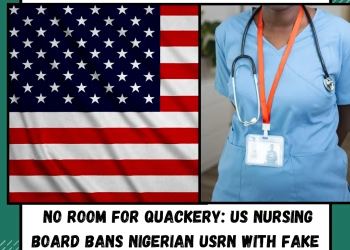
Japa Drama: NMCN Begs Nurses to Stay, Slams War-Torn Destinations
By Fellow Nurses Africa Editorial Team | October 5, 2025
In a poignant and polarizing address, the Nursing and Midwifery Council of Nigeria (NMCN) has urged the newly inducted nursing graduates of Elizade University, Ilara Mokin, Ondo State, to remain in Nigeria and bolster the nation’s beleaguered healthcare system.
Delivered during the induction and oath-taking ceremony of 69 nursing graduates over the weekend, the council’s plea has sparked intense debate, igniting tensions between calls for patriotism and the realities fueling the “Japa” migration trend among Nigerian nurses.
A Plea for Patriotism Amid Migration Surge
Representing Dr. Ndagi Alhassan, Registrar of the NMCN, Dr. Olukemi Awe addressed the graduates with a heartfelt call to serve their country. “Your choice to enter this noble profession is not just a career path, but a calling,” she said. “We need you in Nigeria. Let’s all take care of Nigeria.” The term “Japa,” a Yoruba word meaning to “flee” or emigrate, has become a rallying cry for Nigerian professionals seeking better opportunities abroad, particularly in countries like the United Kingdom, Canada, and the United States.
However, Dr. Awe’s remarks took a controversial turn when she cautioned against migrating to war-torn regions. “If you still want to japa, don’t go to Russia, don’t go to Ukraine, don’t go to Israel. Please, I’m just begging you,” she said, highlighting the risks of practicing in conflict zones. The statement has drawn mixed reactions, with some nurses questioning its relevance, given that most seek opportunities in stable nations rather than war-torn areas.
The Japa Crisis: Why Nurses Are Leaving
Nigeria’s healthcare system faces a critical shortage of skilled professionals, with reports estimating that over 15,000 nurses left the country between 2019 and 2023. Low wages, outdated equipment, workplace violence, and limited career growth opportunities are driving this brain drain.
“The call to stay sounds noble, but we’re overworked, underpaid, and undervalued,” said Tolu Adebayo, a registered nurse, in a post on X. The NMCN’s focus on war-torn destinations has been criticized as out of touch, with many arguing it sidesteps the systemic issues pushing nurses to emigrate.
Despite the plea, some nurses support the NMCN’s call to serve.
“If we all leave, who will care for our patients?”
asked Funmi Ojo, a nurse in Abuja, in an X post. The divide reflects a broader struggle: balancing personal aspirations with the urgent needs of Nigeria’s healthcare system.
A Milestone for Elizade Graduates
The induction ceremony marked a significant achievement for the 69 graduates, who achieved a 100% pass rate in the NMCN’s professional examinations. Dr. Awe noted that the induction qualifies them for a mandatory one-year internship, a prerequisite for obtaining their registration number, license, and certificates to practice as registered nurses.
“This is the beginning of your professional journey,” she said, urging the graduates to uphold the ethics of nursing and learn from senior colleagues.
Prof. Babatunde Adeyemo, Acting Vice Chancellor of Elizade University, praised the graduates’ success, attributing it to the institution’s commitment to excellence in education. “Nursing is a vocation rooted in compassion and service,” he said.
“The oath you take today is a solemn pledge to uphold the dignity of human life and maintain the highest standards of professional ethics.”
A Divisive Directive Sparks Debate
The NMCN’s remarks have exposed deep divisions within Nigeria’s nursing community. Critics argue that the council’s plea ignores the harsh realities of practicing in Nigeria, where underfunded hospitals and inadequate infrastructure are commonplace.
Some also point to bureaucratic hurdles, such as delays in obtaining verification documents for international practice, as evidence of systemic efforts to curb migration. “They want us to stay but make it harder to leave,” one nurse commented anonymously on a nursing forum.
Supporters, however, see the NMCN’s stance as a necessary call to action. With Nigeria’s healthcare system in crisis, retaining skilled nurses is critical to addressing patient care gaps. Dr. Awe encouraged the graduates to pursue continuous learning and professional growth, saying, “Do not allow what you have achieved today to be the end of the road.”
The Road Ahead for Nigeria’s Nurses
The NMCN’s plea underscores a complex challenge: how to retain talent in a system strained by underinvestment while respecting nurses’ rights to seek better opportunities. Addressing the root causes of migration—improving salaries, equipping hospitals, and ensuring safer workplaces—could make staying in Nigeria a more viable choice.
As the 69 Elizade graduates embark on their careers, they face a pivotal decision: stay and serve or seek opportunities abroad. Their choices will shape the future of Nigeria’s healthcare landscape amid an ongoing “Japa” drama that shows no signs of slowing.
Fellow Nurses Africa is the independent voice of African nursing, we educate, inform and support nurses across Africa










